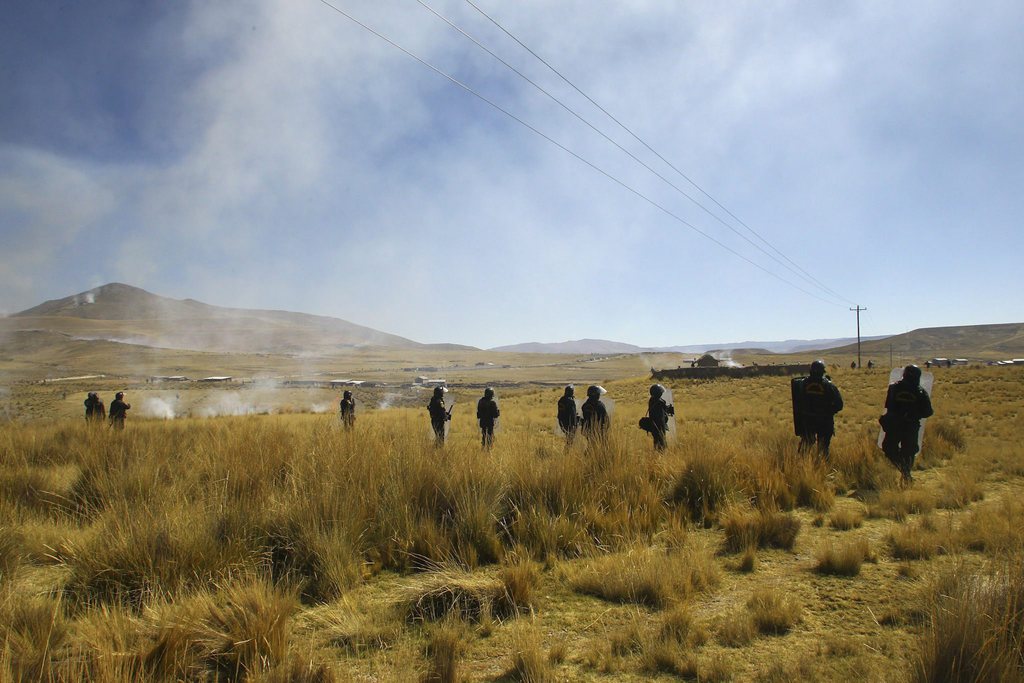Cabinet refuses to legislate on commodity sector

A government report into regulating Switzerland’s commodities sector calls for voluntary measures, but stops short of proposing tighter rules on trading companies. The white paper stresses the need to protect the country’s competitive edge.
“It is important to ensure that the framework in Switzerland is not less attractive than elsewhere,” Economics Minister Johann Schneider-Ammann told a news conference following Wednesday’s cabinet meeting.
“Switzerland prefers voluntary standards which are supported and upheld by businesses. Our experience with such an approach in the past has been positive,” he added.
Switzerland is home to an estimated 500 companies in the sector, including commodities giants Glencore, Cargill, Vitol and Trafigura. The industry’s 10,000 employees contribute around 3.5 per cent to the country’s Gross Domestic Product – more than the tourist industry, according to Schneider-Ammann.
The long-awaited white paper lists 17 recommendations aimed at reinforcing existing standards and supporting international efforts to increase transparency, without pushing for unilateral action.
The economics minister said an inter-ministerial working group would report to the cabinet by April 2014 to monitor and provide early recognition of international and national developments.
Switzerland will examine the impact of increased transparency regulations in the United States and the European Union, he pledged.
Risks
Schneider-Amman did not exclude the risk of a policy based on voluntary measures.
“There are real challenges, including human rights, environmental protection, transparency and reputation,” he said.
Such issues have to be dealt with in constructive manner as Switzerland is interested in supporting the sustainable development of the commodities industry, according to Schneider-Ammann.
“The cabinet expects all companies operating in and out of Switzerland to conduct themselves responsibly, and with integrity,” the report says.
The state secretary in the foreign ministry, Yves Rossier, pointed out the role of international standards, notably by the Organisation for Economic Co-operation and Development (OECD) or by the Extractive Industries Transparency Initiative (EITI).
“It would be naïve to think Swiss legislation alone would have a strong impact. International standards are more likely to be successful,” he said.
Drafted by three ministries over the past 12 months, the paper reportedly prompted heated discussions within the administration with foreign ministry officials pushing for more stringent rules.

More
Is regulating the commodities trade utopian?
Reaction
In an initial reaction, the Swiss-based commodities industry welcomed the survey, adding that the sector was aware of its social and environmental responsibility.
Human rights and aid groups, which had pushed for tighter controls arguing that the traditionally opaque sector exposed the country to risks to its reputation, described the government report as disappointing and insufficient.
They called for greater transparency over payments and detailed reporting of the cash flow of trading companies in the raw material sector.
The centre-left Social Democratic Party, one of four main political parties in Switzerland, says the government acknowledges existing problems. The white paper was a first step which must be followed up with concrete action, a statement said.
Swiss towns such as Winterthur, Lucerne and Lausanne have a long tradition of trading in commodities such as cotton or coffee, cashing in on Switzerland’s central European location.
The Winterthur-based Volkart Brothers company established a highly successful cotton, coffee and spice trading operation in Sri Lanka and India in 1857. The Union Trading Company of Basel was one of the early traders of cocoa beans.
After the two world wars, commodities traders started looking more closely at neutral Switzerland whose economy and political structure had survived the conflicts unscathed.
The first grain trading houses appeared in Geneva in the 1920s while Switzerland offered a neutral venue for US companies to engage in trade with eastern bloc countries during the Cold War.
Geneva’s popularity as a destination for Middle Eastern travellers gave the city an edge as the oil industry started booming in the region. Oil traders were joined by cotton merchants escaping from Egypt in the 1960s.
Russian oil concerns followed in the 1990s, establishing a commodities industry in Zug.
Some of the biggest raw materials traders and extractive firms now based in Switzerland include Glencore, Xstrata, Trafigura, Vitol, Gunvor, Litasco, Mercuria, ADM, Bunge, Cargill, Dreyfus, Holcim and the Kolmar Group.

In compliance with the JTI standards
More: SWI swissinfo.ch certified by the Journalism Trust Initiative





You can find an overview of ongoing debates with our journalists here. Please join us!
If you want to start a conversation about a topic raised in this article or want to report factual errors, email us at english@swissinfo.ch.